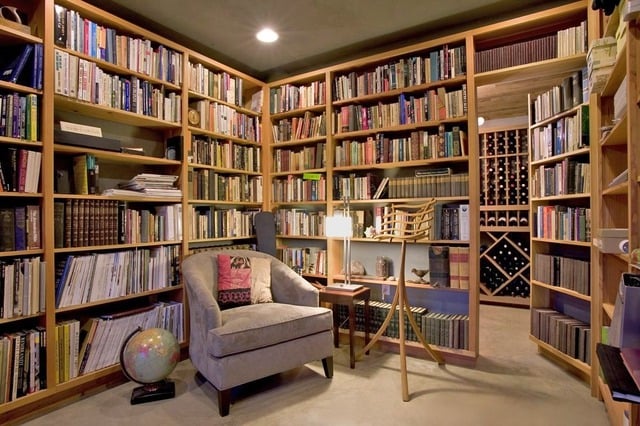The Study Room – A Family’s ‘Brain’, Where Wealth Transcends Generations
There’s a famous saying: “Reading is a lifelong investment, and this type of investment only brings profit and never loss.” It’s a long-term investment process that demands patience and accumulation, but the payoff is more than worth it.
The ancients believed that “a family without the inheritance of knowledge will only have wealth for three generations.” The knowledge of family members and the way they pass on this knowledge to the next generation are reflected in the books they own.
The wisest investment is in education. A family that values learning will easily achieve success, and their family values will continue to develop sustainably.

A famous saying goes, “Reading is a lifelong investment, and this type of investment only brings profit and never loss.”
The biggest difference between people lies in the amount of knowledge they possess. Knowledge brings confidence and enhances creativity. Physical strength may decline with age, but knowledge endures forever. The more knowledge one accumulates, the richer their experiences become, and this knowledge will be passed down from generation to generation. Our ancestors may not have left a lot of material wealth, but they always passed on their wisdom, which is the most precious asset.
Today, there are many examples of people who read and inspire their children to love books, such as billionaire Bill Gates, who highly values reading. Every year, he shares a list of “5 amazing books I read this year.” To select these five books, he has to read a lot more. Gates says, “Reading is how I indulge my curiosity.”
According to Pew Research, the average American reads about four books per year, and a quarter of those surveyed didn’t read any. In contrast, successful entrepreneurs read an average of 17 books per year. Bill Gates goes even further, reading 50 books a year, or about one book per week.
In an interview with TIME magazine, Gates revealed that reading for more than an hour each day was a significant factor in his success. He said, “Every book teaches me something new or helps me see things differently. Reading fuels my curiosity about the world, and that, I think, has made me more successful in my career.”
Whether in the East or the West, from ancient times to the present, the study room and the love of books have always been the way to pass on knowledge to future generations, and that is the most precious legacy.
The Living Room – The ‘Soul’ of the House, Where Family Values Are Reflected
Since ancient times, the living room has been of great importance as it reflects the feng shui of the entire house. The ancients said, “Just by looking at the entrance, one can tell the rise and fall of a family.” This means that by standing at the door and observing the inside of the house, one can predict the fate of the homeowner.
The atmosphere and beauty of the living room greatly influence the family’s luck. Another saying goes, “A door that welcomes many guests will also welcome wealth, and a house that welcomes people will have everything going smoothly.”
The living room gives guests their first impression of the house. If it’s cold and uninviting, guests won’t want to stay long, and others may not visit often, directly impacting social relationships and the family’s luck.

Since ancient times, the living room has been highly valued as it reflects the feng shui of the entire house.
A busy living room indicates a family with vibrant energy. A host with many visitors is undoubtedly a successful person with achievements and good relationships. The constant flow of guests also reflects the success and positive connections of the host.
The living room also showcases the host’s style and taste. A neat, tidy, and clean living room indicates a careful, polite, and refined host, which positively impacts the family’s descendants.
According to feng shui principles, decorations in the living room should be carefully chosen. Sharp objects like swords, fiery items, gambling paraphernalia, and animal trophies such as deer, bears, or tigers should not be displayed. These items can generate heavy yin energy, leading to disharmony, arguments, and even violent behavior within the family.
It’s best to avoid too many sharp objects and metal decorations, as they can create a chilly and hostile atmosphere. Instead, opt for wooden furniture and rugs to create a cozier space. Gambling items may also give guests a negative impression of the host and affect their trust.
The Kitchen – An Empty ‘Heart’ Struggles to Attract Wealth
The kitchen is considered the heart of the family, where the fire burns and food is prepared for all members. It’s also a source of luck and fortune for the homeowners. Therefore, it’s essential to keep the kitchen well-stocked and not empty. Even if you don’t have specific food items, maintain a certain level of fullness in your cabinets or refrigerator.
According to ancient beliefs, a happy life doesn’t necessarily equate to wealth or opulence. However, having enough food and clothing is a basic standard for laying the foundation for prosperity. If the kitchen is always empty and lacking food, the family will constantly face the question, “What’s for dinner?” which can hinder success and stability.
Additionally, regular use of the kitchen is crucial. If the kitchen remains unused for an extended period, it can negatively impact the family’s luck, leading to distance and even conflicts among family members.
A kitchen also reflects a family’s happiness. A happy family usually has a cozy kitchen filled with laughter and togetherness during mealtimes. In contrast, an empty and cold kitchen can evoke a sense of loneliness and a lack of care among family members.
The Ultimate Guide to Wealth and Prosperity: Unlocking the Secrets of Fortune with Three Magical Trees
“Unveiling the Trio of Fortune: Trees to Embellish Your Home’s Prosperity and Luck
There are three types of trees that homeowners should consider planting in front of their houses to attract wealth, prosperity, and an abundance of blessings for generations to come. These trees are not just aesthetically pleasing but are believed to hold symbolic value, bringing good fortune and a prosperous future to those who embrace their presence.”





































